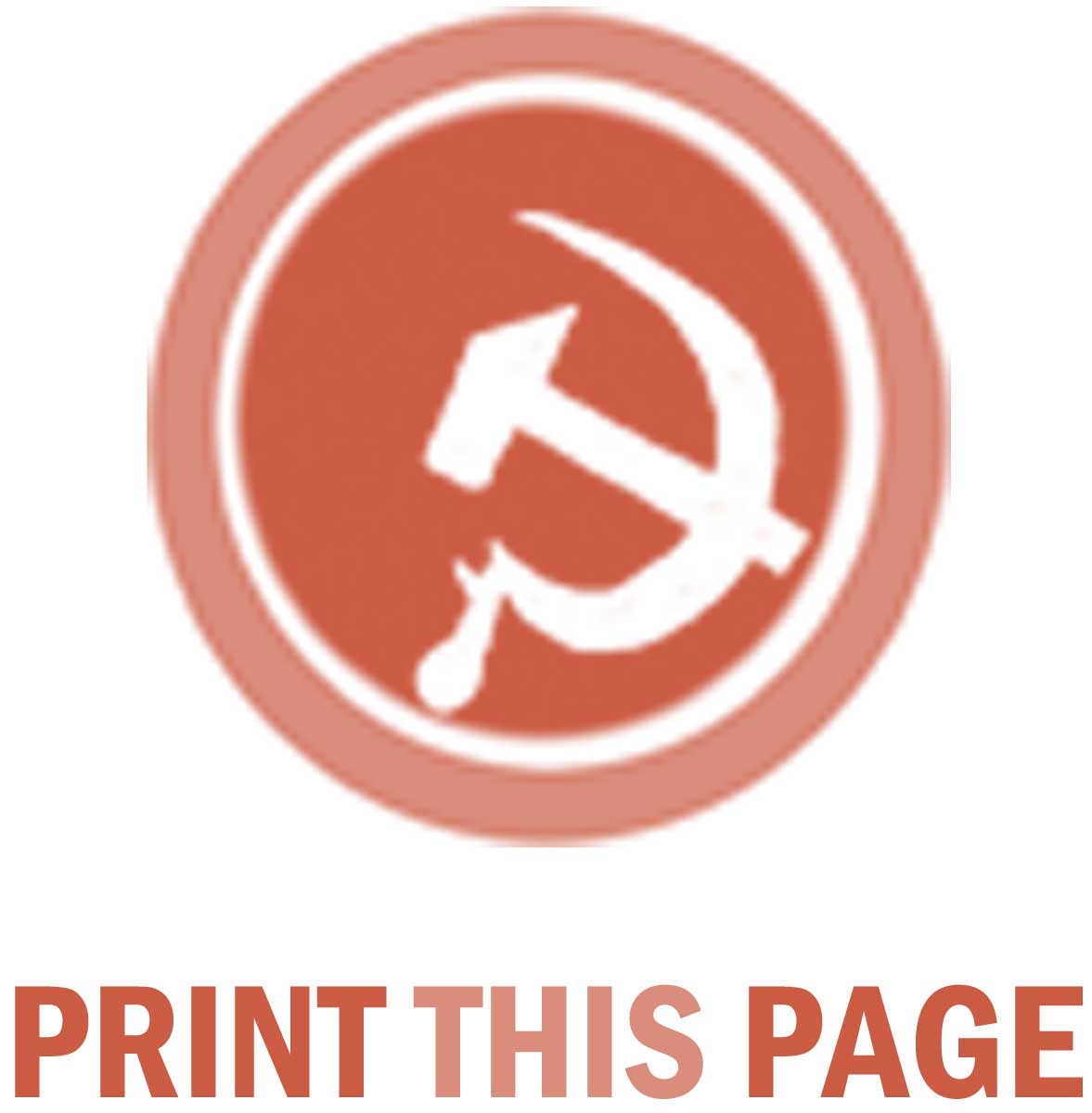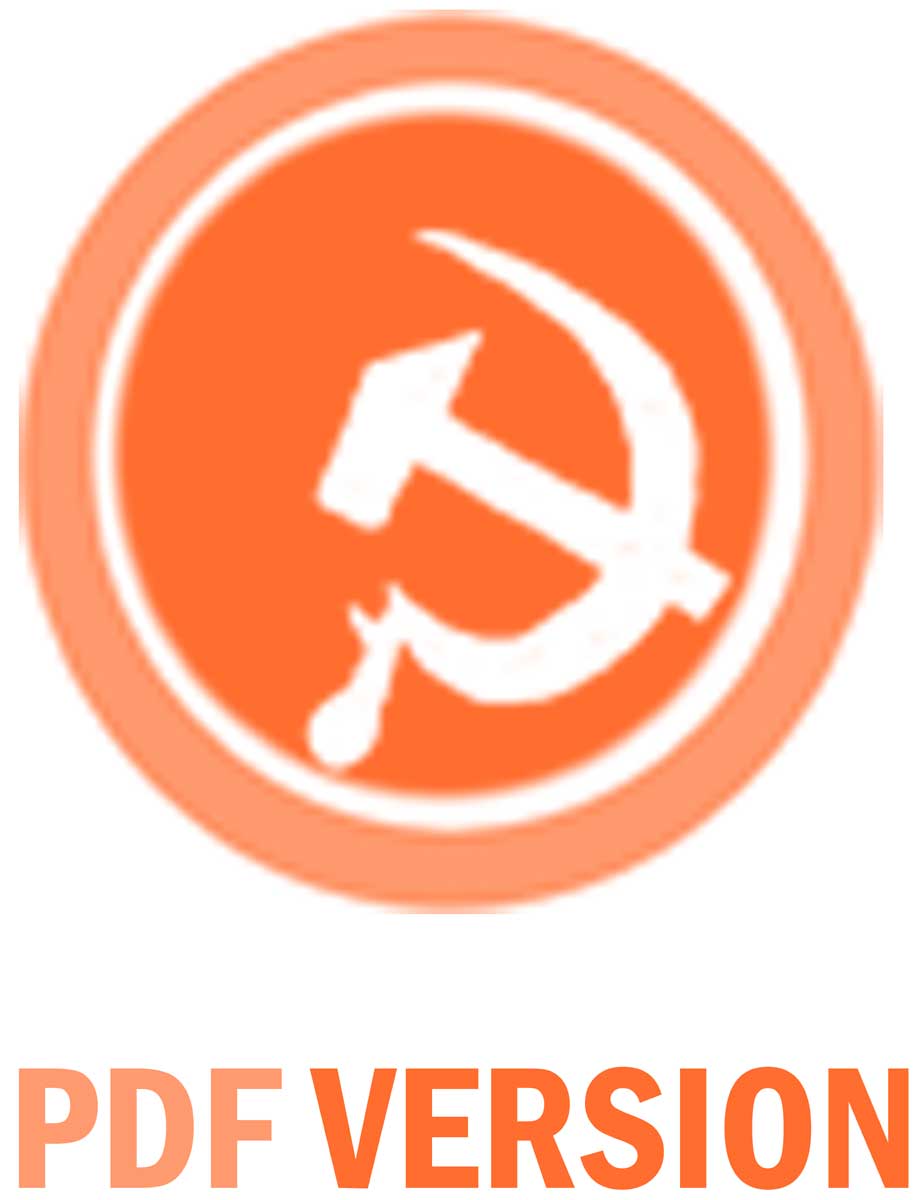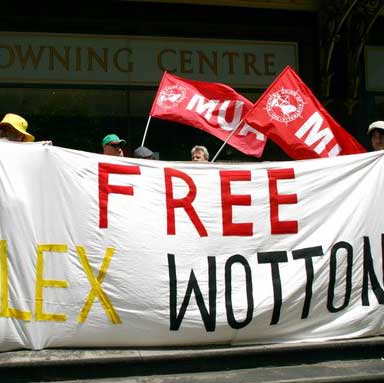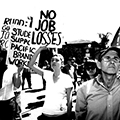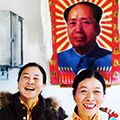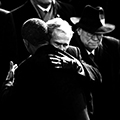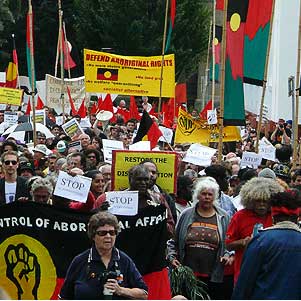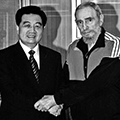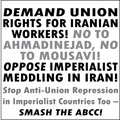8 August 2008: Beijing during Olympics opening ceremony.
March 7 - Factories closing, recession, financial institutions collapsing. These realities which are engulfing capitalist countries (realities which hurt working class people the most) are making propagandists for the “free market” system rather uneasy. In fact, more than uneasy. The whole situation is likely to give advocates of capitalism a case of the runs that is even worse than that which afflicts their stock markets. After all, the main argument that they have been throwing at the masses for decades is that, despite everything, “capitalism develops the economy.” How are they going to bailout pro-capitalist ideology now!
If that were not bad enough, the capitalist rulers know that everyone is talking about “Communist China’s” economic successes. They would know that people would’ve watched the Beijing Olympic Games and would have noted the efficiency with which the Peoples Republic of China (PRC) organised the events. They know that Olympic viewers could not but be impressed by the marvelous stadiums that the PRC built and would have been wowed by the beauty of the Olympics opening ceremony that the People’s China conducted. And those who thought more deeply about it all may be struck by how this was all happening in a country that in its pre-1949 capitalist times was hopelessly subjugated by Western colonial powers.
For a long time, pro-capitalist intellectuals said to working class people: although socialism seems a lot fairer to you, it is economically “impractical.” But for many years now, socialistic China has been pulling hundreds of millions of its people out of the terrible poverty that they had inherited from the old capitalist days. Today, the PRC’s state-owned banking system remains solid while capitalist financial systems collapse around them.
So how are the capitalist rulers trying to deal with this nasty, this imploding headache of an issue, the issue of the PRC economic juggernaut? Well, they have set their propaganda machines to be able to run in two completely opposite directions when the China button is pushed. In one option, they make all sorts of slanders about the alleged effects of China’s “communist rule” on “human rights” and other issues. In Option 2, however,when having to mention China’s economic successes they claim that her development is due not to socialism but to a supposed growing “embrace of capitalism.”
Nevertheless, attempts to hide the socialistic bedrock of China’s development are belied by the nature of China’s core economic sectors. These sectors remain controlled by public enterprises. The enterprises involved include the giants – like Boasteel, Chinalco and CNOOC - that have been holding up the Australian economy through their imports of Australian iron ore, aluminium and gas. Every single one of the PRC’s biggest 22 firms remain majority state-owned (The Australian, 18 August 2008.) And of China’s top 500 tax-paying companies, 89.8% of the taxes are paid by state-owned enterprises (2007 figures.)
To be sure, since 1978 the Beijing government has embarked on a “reform” and “opening” policy that has allowed the market to play a greater role in the economy and enabled capitalists to penetrate chunks of the economy. This led to much greater inequality and allowed capitalists to gain ownership or part-ownership of big parts of China’s light manufacturing for export industries. Alongside these economic concessions to the right came a dangerous rightward ideological drift in Beijing’s politics. The PRC government still proclaimed that it was building socialism but this was mixed with ambiguities about its commitment to oppose capitalism.
Nevertheless, the PRC remains a socialistic state, a workers state. This state has serious bureaucratic deformations and lots of problems. Yet it remains the state that was created by the overthrow of capitalist rule in 1949, it remains the state that was created by the Chinese Revolution, by the heroic victory in struggle of hundreds of millions of poor people, tenants and workers. It is this character of the PRC that has enabled China to ensure that its core economic sectors – steel, oil/gas, banking, communications, shipping, automotive, shipbuilding, rail manufacturing, power etc – are owned collectively by all the people. And it is this pro-socialist character of the PRC state that is the barrier to capitalist restoration in China.
It is now more difficult for anti-communist mouthpieces to simply say that China has “gone capitalist” because under President Hu Jintao PRC politics have shifted somewhat to the left in recent years. This movement to the left is rather tenuous and contradictory and the program of the Communist Party of China (CPC) leadership still falls way short of the approach that a revolutionary communist party would take. Nevertheless, the shift to the left is evidenced in both Hu’s moves to redistribute income to the poor and in the Beijing leadership’s more emphatic statements about the need to maintain a socialist path. Faced with this reality, Western media and politicians are resorting more and more to old-fashioned anti-communist propaganda against China – propaganda of the type that they used in their earlier Cold War against the Soviet Union. This includes the well-worn refrain that “socialism does not work.”
Now, how do people, that claim that “socialism does not work,” try to sound credible when everyone can see that it is capitalism that is in the midst of an economic crisis? Well, what they are prone to shouting is that China too is having an economic meltdown. And that is what many media accounts in Australia and the U.S. have been blaring out in the last few months: that China’s economy is “dramatically” slowing and is having a “huge downturn.” These reports are indeed connected to reality but are also deliberately exaggerated. The truth is that last year China’s economy grew overall by over 9% which is not only a long way from a recession but also over twice the growth rate that most capitalist economies have achieved at the best of times in the last few years. This did not stop The Sydney Morning Herald (23 January 2009) from triumphantly headlining “The great stall of China” after it was announced that China’s economic growth rate had slowed to 6.8% in the fourth quarter of 2008.
To be sure, the crisis of the capitalist economies has already affected China with her export industries especially hit hard. But the centrality of the public sector in her economy gives the PRC the potential to ride through the global storm and ensure that the global crisis does not lead to massive poverty. Will this potential be realised? Well, the answer to that question will be decided by who wins the intense political struggles that are happening within the PRC between the right and left wings. On the right stand those who represent the interests of China’s tenuous layer of capitalists. They cry poor over the demise of many private sector enterprises and demand more support for the private sector. On the left of the debate stand those who understand that the PRC must boost its public sector even more. In a country that is dominated (in however a deformed way) by socially-owned industry this latter tactic has been proven to work. It is through a massive program of state-funded infrastructure construction that the PRC was able to sail through the late 1990s Asian economic storm while neighbouring capitalist economies plunged well below the surface.
China has, however, changed since the late 1990s (although not decisively.) Public ownership is still dominant but the public sector has been weakened somewhat by the privatizations of small enterprises that occurred in the late 1990s and early 2000s. Today, right-wing political forces miss no opportunity to push for further weakening of state control of the economy. If their economic prescriptions are administered it would be disastrous for the Chinese masses. Making China more subject to market forces means making China more vulnerable to the very forces that are wreaking havoc in the rest of the world.
The battle between right and left over China’s policy response to the global recession is part of a bigger ongoing struggle between, on the one hand, those pushing for capitalist counterrevolution and, on the other, those forces striving to defend the PRC’s socialistic foundations. Oscillating between these two ends is the bureaucratic/government layer which bases itself on the socialistic economy but at the same time makes many harmful accommodations to capitalist elements both within and outside of China. Within this administrative stratum there is itself a wide range of political shadings.
The biggest factor in the whole Chinese equation is the working class whose interests lie with the victory of the pro-communist forces. Already militant workplace struggles against ill treatment and corruption have constrained pro-capitalist advances and deterred further privatisation. Will the Chinese working class and pro-communist intellectuals be able to find the consistent direction needed to ensure that the PRC builds on the 1949 victory and renews its march to socialism? The answer to this question is being fought out every day within China. And it is being fought out most intensely right now over the issue of how to respond to the world economic crisis.
The PRC’s Struggle against Sweatshops
Where the global crisis has affected China most is by precipitating the downfall of tens of thousands of factories in her light processing sector. These plants had been among the ones making clothes, shoes and toys for export. Millions of workers have lost their jobs. In the country’s main toy manufacturing base in southern Guangdong, 922 of the province’s 3,089 toy exporters closed last year.
Unlike the PRC’s basic economic sectors, the light-manufacturing sector has significant private ownership. In many cases the factory owners are foreign investors from Hong Kong, Taiwan, Western countries or South Korea. The foreign capitalists do not always fully own plants - sometimes they are in joint ventures with Chinese state enterprises or local governments. In other cases factories are owned by mainland Chinese capitalists. China’s light manufacturing sector is concentrated in the Southeastern corner of the country. But working in them are tens of millions of “migrant workers” – people from rural areas who have moved to the Eastern and Southern cities to work in manufacturing and construction. It is important to note that workers in privately owned enterprises generally have to put up with much longer hours, less stable employment, less pay and worse conditions than those employed in the PRC state sector. There have been many examples where “migrant workers” in particular working in the private sector (both foreign-invested and local capitalist-owned) have faced bad exploitation.
Fortunately, some of the lost jobs in the private manufacturing sector are being soaked up by other employers. Importantly, many of the new jobs are going into the public sector. Although the demise of many private firms has in turn chipped away at the business and profits of state-owned industrial firms in sectors like steel and aluminum, the big socialistic, state enterprises are retaining their workers and in some cases hiring anew. Meanwhile, millions of workers are being employed in state infrastructure projects and in expanded employment in public sector social services like health, education and land conservation. The PRC must ensure that this expansion of the public sector occurs much more quickly. Every worker laid off by a private business must have a guaranteed job in the state sector and every already unemployed person should also be able to gain employment in public enterprises. This is an urgent struggle!
The connection between the closure of privately owned exporters and the global crisis is obvious. With Western customers having less money and confidence to buy consumer goods, the Chinese export manufacturers are losing business. But there are also other reasons why the private manufacturers in China are going bust. The main one is that the worst exploiters of labour are being increasingly forced by a combination of official action and workers’ struggles to improve employees’ pay and conditions. Wages of Chinese workers have risen at an average rate of 15-20% per year over the last three years. State forces have managed to bring to order many private bosses who owed workers large amounts of back pay. And crackdowns on employer abuses have even targeted big name multinationals operating in China like McDonalds, KFC and Wal-Mart. Most notably on 1 January 2008, the PRC brought into force a Labour Law that significantly improves employee rights. Under the new Labour Law casualisation of the workforce is restricted. Provisions require employers to hire workers on a permanent basis if workers are to remain employed after having served two fixed-term contracts. And any labour hire company now has to pay workers even for days they are not placed in jobs. These pro-worker measures are all good things. But for sweatshop private bosses whose profits were based on heavily exploiting workers, the changes have meant that their business may no longer be viable. Even before the global financial crisis hit full scale over 67,000 factories had closed in China in the first half of the year.
An important aspect of the new pro-worker regulations is that they have the effect of protecting the state enterprises from being unfairly undercut by private firms that have substandard working conditions for their employees. The regulations are shifting the balance between state and capitalist enterprises back towards the state firms.
This shift away from the private sector processing industry is, to some extent, actually a conscious policy of the PRC government. Defiantly communist elements within the left wing of the Communist Party of China (CPC) have for many years argued that the often foreign-invested, low wage manufacturers have not brought real benefits to Chinese workers but simply lots of profits for their owners. Although such points have been far from fully accepted by the CPC leadership, they have to a degree been incorporated into Beijing policy. On 7 November 2007 the Chinese government issued a new policy that would restrict overseas capitalist investment into China. These regulations restrict foreign capitalist firms from exploiting “important and non-renewable” mineral resources and ban them from entering industries strategic to “national economic security.” Given that the PRC’s industries considered strategic to “economic security” are dominated by state-owned enterprises, the new restrictions are welcome. This foreign investment guide does continue with the policy of encouraging overseas companies to invest in high-tech industries (something that if strictly controlled can be a useful, if fraught, policy for a former neocolony that still needs to borrow technology from the rich imperialist powers.) Importantly, however, the guide restricts overseas capital input into traditional manufacturing industries.
In response to the global crisis, the PRC has taken economic measures that have the effect of continuing the partial shift away from the low-wage, private enterprises and back towards the public sector. Billions are being poured to upgrade the big state-owned enterprises that dominate China’s steel, power, shipbuilding and machinery industries. Big government projects are being implemented in sewage, ports and land conservation and to improve drinking water supplies in rural areas. And there is massive state construction of railways – both long distance and urban (notably ticket prices for any trip in Beijing have been reduced to just 2 yuan - the equivalent of 45 Australian cents.)
This recent tendency to fall back on the public sector is not simply a question of ideological choice on the part of the CPC. Mainly it is pure necessity. Looking to the private sector to avert a recession will not work because capitalist-owned enterprises are driven solely by the profit motive and when they cannot get high prices during a downturn, business owners will not boost production. In contrast, in a place where socialist power rules the state sector can simply be commanded to maintain production and employment for the greater good of the people.
It is true that in the capitalist world too governments of all stripes – whether military dictatorship, conservative, small-l liberal or social democrat – are somewhat attempting to use public spending to save their economies. But the potential for doing so in these countries is greatly restricted in comparison to a country like the PRC. For in the capitalist countries the public sector does not dominate the key sectors – like steel, banking and aluminium refining - and therefore lacks the muscle to turn around the whole economy. Furthermore, in these countries the state overseeing the public sector is itself tied at every level to the interests of the big capitalists – to the interests of people who see the public enterprises as only accessories to their pursuit of a quick killing in private corporations. This is rather different to the PRC where the major state companies are constrained (albeit often tenuously) to meet overall social goals. While in the capitalist countries the public companies are often headed by former or even serving private sector executives, in the PRC the heads of state enterprises are typically Communist Party members selected by party committees for their perceived ability to ensure that public goals are achieved.

Putting up a bit of a fight: Head of China’s parliament and number two man in the Communist Party, Wu Bangguo addresses March parliamentary meeting. In his Work Report, Wu stated that China’s legal system is a socialist one and insisted that China would never copy the political system of Western capitalist countries. Wu’s comments were aimed at forces within and outside the Communist Party that have been calling for embracing aspects of Western-style, that is bourgeois “democracy.”
The Virulent Right Wing
Beijing’s response to the global crisis is not without serious flaws. One government scheme is to encourage laid off migrant workers from the rural areas to start up their own self-employed enterprises. Banks have been told to increase lending for these start-up businesses. The measure is being taken to try and relieve unemployment. But promoted on a mass scale such a plan is only going to lead to shattered dreams for many. When lots of people start small businesses only a few will flourish. Rivalry between struggling small producers will fuel disputes and produce an unfriendly society. Tensions could spill over into ethnic hostilities and these can easily be manipulated by overseas capitalist governments and Chinese anti-communists.
Furthermore, small-scale producers are typically inefficient in using resources. To encourage them to spawn goes against Beijing’s stated goals of reducing energy consumption, protecting the environment and improving workplace safety. In the end, in any case, the nature of economy means that small-scale producers will get gobbled together by one means or another into larger, more efficient ones. But that just means a new private sector, the same type whose crisis caused the millions of “migrant” workers to be unemployed in the first place.
Any plan to prop up the ailing private sector does not make economic sense. But there is strong lobbying for Beijing to do just this. The source of such lobbying is that layer of capitalists that have emerged in China since 1978. These capitalists utilise officially tolerated pressure groups – in particular the All China Federation of Industry and Commerce (ACFIC) which groups together private sector bosses. The economic influence of the private entrepreneurs has inevitably also nurtured the rise of a layer of academics and economists who speak, consciously or unconsciously, to the interests of these capitalists.
It has long been a demand of China’s right wing that credit restrictions be eased for private sector enterprises. Since the global crisis began they have unfortunately made some headway on this demand. Although Beijing has focused its response to the global crisis on financing the state sector, it has also decreed easier credit for the struggling small and medium size enterprises (such businesses unlike China’s large enterprises are often privately owned and the term “small and medium size enterprises” is often used in China as a code word for capitalist-owned firms.) Today, China’s private bosses win such concessions by crying poor. But they and those intellectuals that back them know that if the world market picks up in a few years, the precedent of easier credit will put the capitalist sector in a better position to compete with the socialistic sector than it otherwise would be in.
In their strategies, the Chinese right is brains trusted by Western capitalists. All the pronouncements of Chinese “pro business” forces (like the demand for less credit restrictions on private enterprises) can be heard in even louder form from “free market” Harvard/MIT economists, Western China “experts,” Murdoch media scribes and journals like The Economist. In 2005-2007 U.S. and European business umbrella groups (that represent the likes of Microsoft, Wal-Mart and Intel) ran an intensive campaign to try and get the PRC to weaken its, then impending, pro-union Labour Law.
Those promoting capitalistic economic policies in China, however, have a big problem: they do not hold state power. Political power is still held by a Communist Party, however deformed from authentic Leninism that that party has become. That is why even more energetically than they demand “free market” policies in China, the Western and overseas Chinese capitalists demand greater “human rights” and “freedoms” for political forces hostile to communism. Without being able to destroy the pro-socialist state, not only will the extension of the private sector be stunted but even the existing capitalist enterprises will sometimes have their “freedom” to operate according to the profit motive curtailed.
The tendencies that most openly aim for the destruction of the PRC working class peoples’ state are various U.S.-backed “pro-democracy” dissidents. But these are not the only forces working in that direction. There are also those at the most extreme right of the CPC. These elements too are being promoted by the overseas imperialists. They often sing the same tune as the dissidents but in a more officially acceptable way. Also, in between the liberal right-wing of the CPC and the CPC mainstream are those that do not necessarily seek an anti-communist counterrevolution along the lines of that which occurred in Eastern Europe and Russia in 1989-92 but think, quite wrongly, that it is possible to march just half way in that direction.
There is also a range of officially accepted rightist elements in China that exist outside the CPC. There is the ACFIC mentioned above. Then there are certain small non-CPC parties that are part of the Communist-led governing coalition. While all these eight non-CPC parties claim to support socialism and accept the leadership of the Communist Party, some of them are based on the private enterprise bosses and promote their interests. If counterrevolutionary forces in China were to make a future bid to seize power, such parties would become organising nests for the capitalist restorationists. This is what happened in Eastern Europe in the late 1980s-early 1990s. For example, in the former East Germany the Christian Democrat party had been part of the socialist-led governing coalition but as capitalist West Germany made its bid to overrun the workers state in the East, the East German Christian Democrats quickly became a base for the anti-socialist forces.
The call for more power for non-communist forces in China has thus been a major demand of the right. This call is made under the guise of promoting “democracy” and “pluralism.” Just what this deftly put “greater voice for non-communists” would mean was seen in the demands of private entrepreneur representatives at the annual 2008 session of China’s peak advisory body, the People’s Political Consultative Conference. There capitalist tycoon Zhang Yin called for the weakening of the new Labour Law’s provision that guaranteed job stability for long-term employees. Banging the same agenda, Song Beishan, deputy chairman of the ACFIC, slimily argued that “small and mid-sized businesses” should not be “deterred from hiring people.” Meanwhile, Zhang Yin additionally demanded tax cuts for the rich.
Fortunately, Zhang Yin’s proposals were denounced in the PRC as “pro-rich.” A month later, her company Nine Dragons Paper was the subject of an official investigation by the pro-CPC trade union federation for violations of workers’ rights. This is exactly what the right wing does not want. They want Chinese capitalists to both be able to “freely” exploit labour and to be able to “freely” “advocate” the predatory interests of their class without “fear” of consequence.
The political threat from the Chinese capitalists should not be underestimated. True, they are widely disliked by the PRC public. True, they are small in number. But in the real world, “one person, one voice” exists only in myth until a completely egalitarian society has been accomplished. The relative wealth of the private bosses and the massive support they get from overseas capitalists allows them the resources to potentially sway public opinion in China in a way that is greatly disproportionate to their numbers. They know this and this is why they and their backers demand the “right” to an “equal” voice.
Trotskyist Platform: PO Box 1101, Fairfield NSW 1860, Australia.
E-mail: trotskyistplatform@gmail.com
Phone (Australia): 0417 204 611
Phone (International):0061 417 204 611
Left…Right…Left
The struggle between the pro-capitalist and pro-communist forces within China is a seesawing struggle. In 2005 the mood swung to the left as anger mounted over inequality and workplace deaths. After a series of
fatal accidents in private, often illegal coal mines the PRC government in August 2005 started to literally have dozens of privately-owned mines dynamited (to stop the private bosses from reopening them in connivance with corrupt officials!) At the same time Beijing increased funding for the
larger and safer state-owned mines. These measures taken together amounted to a move towards the partial renationalization of the coal mining industry. Later in October 2005 when it was announced that state-owned machinery manufacturer Xugong would be sold off to the notorious private equity group Carlyle there was a storm of opposition from staunch communists who protested at the loss of socialist property. As a result the Carlyle bid was stalled as heated debate went on in regulatory authorities about how to handle the proposed takeover. Then in March 2006 at the annual meeting of China’s parliament, the NPC, a plethora of speakers denounced capitalist incursions and exposed ill treatment of migrant workers by private bosses.
However, after March 2006 the right clawed its way back. Elements within an anti-egalitarian party grouping, inexactly dubbed the “Shanghai Faction,” started to undermine the more left-leaning Hu Jintao regime. They complained that Hu’s measures to ensure the building of more low-cost housing for the poor was anti-market and objected to moves to redistribute resources from the richer Eastern provinces to the poorer inland ones.
However, in September 2006 the “Shanghai Faction” was dealt a serious blow when their de facto political leader, Chen Liangyu was arrested in a corruption scandal and sacked as Shanghai party chief. Simultaneously, armed Chinese police were posted at Shanghai airports to stop government officials wanted for questioning in the scandal from fleeing. The defeat of Chen and his allies was soon followed by one of the most left-leaning CPC meetings in years. The October 2006 CPC Central Committee plenum focused heavily on boosting public health care and education, slashing executive salaries and redistributing wealth from the rich to the poor. The slogan was to build a “harmonious socialist society.”
But six months later the left-wing push started to meet greater opposition. It was a time when minority stakes in several large state-owned enterprises were sold off and when private investors were getting rich in a stock market boom. The government promise to help the poor remained and many major practical measures were indeed implemented but the language no longer strongly emphasised redistribution from the rich. Similarly, the call to build a “harmonious socialist society” which implies a clearly pro-socialist direction was used much less and instead the main slogan became the more vague “scientific concept of development.” While Hu used the “scientific concept of development” to stress moves to improve the lot of migrant workers and the rural poor, the slogan was deliberately meant to, and did, give comfort to all sides. Such was the tone of the October 2007 CPC Congress, a five-yearly meeting that sets major policy direction. The meeting did codify a greater emphasis on social welfare and public services than the previous congress. However, the pro-poor tone was not as emphatic as would have been expected a year earlier. There was something in the congress resolutions to please all factions. The right was encouraged at signals that non-communists would be granted greater representation in government.
Thus, the right wing expected 2008 to be a year where they made major strides. After all, it was to be the 30th anniversary of the “Reform and Opening Up” policies. Like their brains trusts abroad, the Chinese right hoped that pressure to seek acceptance from the world’s capitalist powers for the sake of a successful Beijing Olympics would force the PRC to make greater accommodations to counterrevolutionary forces. But things turned out differently. When anti-communist demonstrators tried to sabotage Olympic torch relays in Western cities under the guise of support for the former Dalai Lama-led feudal rulers of Tibet, pro-PRC Chinese students spectacularly responded. They organized mass demonstrations in China and in overseas cities. In Canberra on April 24 last year, tens of thousands of Chinese students, many carrying the communist PRC red flag, rallied. Defying a hostile anti-communist media, they swamped the much smaller numbers of anti-PRC demonstrators that were seeking to score points during the Australian leg of the torch relay. The determination of the pro-PRC students both abroad and in China, swung the mood within the PRC. Western anti-communist China watchers were stunned as pro-Western forces within China were angrily denounced. The left was now on the front foot. In an article published in the weekly news magazine of Xinhua official media, Jiang Yong, a unit director at the China Institute of Contemporary Relations stated that “multinational companies have long ignored the lawful rights of Chinese labourers” and singled out children and relatives of some top officials for becoming lobbyists for these corporations (South China Morning Post, 8 May 2008.) The academic also criticized the overseas stockmarket listings of stakes in some majority state-owned giants saying that this had led to losses of public resources and control. Then in July the Carlyle profiteers were finally put out of their misery on their Xugong bid when it was announced that they would get absolutely no stake in the state-owned manufacturer.

April 24, 2008: Canberra leg of the Olympic torch relay.
Another important factor shaping PRC politics last year was the horrific earthquake in Sichuan province. In order to save those affected and begin reconstruction, the PRC state had to ensure that finance, transportation and construction resources were mobilised under public control in a planned way. Pure necessity in the midst of this crisis demanded that private profiteering be impinged upon and instead the “advantages of the socialist system be brought into play.”
As 2008 progressed, the political mood swung back and forth as it had in the previous few years. But by August the PRC was hosting a supremely successful Olympics while the financial system in the capitalist world was in the process of imploding. The capitalist crisis has had many economic effects on the PRC (some of which are discussed earlier in this article.) Among these are the effects of the crisis on the PRC’s banking system. Due to the credit crunch in their base countries, those Western banks that had earlier been allowed in as minority stakeholders in Chinese state-owned banks became desperately short of cash. To make matters worse for them, the majority state owners of the Chinese banks they had invested in started to outrageously “violate” “business principles” by insisting on massively increased lending during the midst of an economic downturn. Thus by the end of last year Western capitalist banks like Bank of America and UBS had had enough. They decided to sell off their stakes in Chinese majority state-owned banks. Meanwhile, the PRC government was buying up stock. The minority stakes in PRC banks that capitalist financial institutions had acquired just a few years earlier started to effectively be re-nationalised.
Perhaps most importantly, however, has been the ideological impact of the capitalist economic disaster. After all, it is getting rather difficult for PRC officials to keep a straight face when listening to an American politician lecture them about the “advantages” of the “free market” system. Just two years ago then U.S. Treasury Secretary Henrik Paulson delivered a speech in Shanghai where he lectured that China should privatise its state-owned banks. He claimed that China’s banks would “lose trillions” if they did not “open up” (The Australian, 9 March 2007.) “An open, competitive and liberalised financial market can effectively allocate scarce resources in a manner that promotes stability and prosperity far better than government intervention,” Paulson insisted. Oh really! Whose banks are “losing trillions” now!
So, it might not seem to be the best time in China to be an advocate of capitalism. Unfortunately, the danger from the right has far from diminished. In the swirl of the economic crisis, the Chinese capitalists and those local-level government officials under their sway have been using the threat of factory closures as an excuse to undercut the new Labour Law. Meanwhile, Chinese hardline anti-communists and their Western backers are rabidly praying for an opportunity. They hope (secretly or openly) that unemployment in the PRC caused by the global crisis can be turned into anti-communist revolts. That is why they are willing China’s economy to also collapse.
Soft Lefts: Please Don’t Ask Me to Stand Up for Communist China in front of My Middle Class Friends
Of course, one expects anti-communists to hope for an economic collapse in the PRC. But you would not expect socialists to wish the same. Right? Wrong! In the Western world there are, unfortunately, many left groups who feel that their political platform depends on the spread of the Great Recession to China. For example, in an article titled “China and the Global Economic Crisis,” the Australian Democratic Socialist Perspective (DSP) trumpets with enthusiasm the economic difficulties in China (
Green Left Weekly, 15 November 2008.) Singing a similar tune is an article from the Solidarity group in their October 2008 journal (
Solidarity Magazine.) The majority of the Australian left groups are indeed hostile to the PRC state – not only the DSP and Solidarity but also Socialist Alternative and the Revolutionary Socialist Party (a recent split from the DSP which avowedly stands on the past program of the DSP.) There are notable exceptions. Trotskyist Platform and the Communist Party of Australia, while having quite different perspectives, both solidarise with the Chinese workers state. But let us for the moment examine the hatred of the PRC of other socialist groups in the West.
Those left groups who are against the PRC state are shaped by a wish to avoid conspicuously standing up to dislike for China within progressive middle class circles. These circles are shaped by anti-communist, anti-PRC propaganda from the mainstream media. Furthermore, young middle class individuals are sometimes already prejudiced against communism. No matter how “left-wing” they may consider themselves, if these individuals harbour options of later becoming an upper class high flier, they are not really going to be loyal to a social order that promises to firmly hold down the upper class. Thus a common view within the left-liberal middle class is that: “I support socialism but not communism.” What they mean by this is that they would like to have a socialist society but are not prepared to see capitalist forces (that would inevitably resist the construction of such a society) being resolutely halted by a workers state. This is like one saying that one supports workers’ rights but opposes firm union action against capitalist bosses and scabs. Now, most dedicated members of socialist groups do not themselves buy such dreamy notions - neither about the struggle for workers’ rights nor about the struggle for socialism. But the problem arises when these socialists adapt to others within their group’s base (less consolidated members, non-member sympathizers and those that they are trying to recruit) that are affected by liberal illusions.
For leftists living in Western countries the pressure to not defend the PRC is greater than the pressure to not defend Cuba. As far as the Western capitalist ruling classes are concerned it is China that is the big bogeyman. And that is because China as compared to Cuba is quite literally … big! Furthermore, for Australian
anti-communists the PRC is a bogeyman right here in Asia rather than in the far off Americas. Thus it is the PRC rather than Cuba that is the object of most anti-communist hostility in Australia. Reflecting this reality, some left groups (like the DSP and RSP) that are admirably able to stand strong in the face of the anti-communist stream against Cuba, get swept away when hit by the anti-communist torrent against the PRC.
Now, how do those left groups who bow to anti-PRC anti-communism still remain nominally Leninists and Marxists? Well, the way they have squared this circle is by claiming that China is simply just another capitalist country. That is the convenient analysis that justifies their opposition to the PRC. Yet today the differing responses to the economic crisis between the PRC and the real capitalist countries illustrate just how much the social system in the PRC is different to capitalism. While the U.S. government hands out hundreds of billions of “bailout” dollars to the rich owners of private banks, the PRC stimulus package has as its priority the building of low-rent public housing. Over 2 million low-rent units will be built as well 4 million low-cost homes. Additionally, between 2009 and 2011 the PRC plans to reconstruct houses for over 2.2 million people living in poor quality housing in forest, farming and mining areas. This is in sharp and shocking contrast to the swathes of houses in the U.S. that are being left empty and derelict by the eviction of thousands of householders who are unable to keep up their mortgage payments to the leaching American banks (a phenomenon that did, indeed, spark the start of the Global Financial Crisis itself!)
One of the problems with analyses that claim that the PRC is “capitalist” is that such a view accepts a rather prettified perspective of the economic potential of capitalism. A principal reason that Marxists have always had for wanting to overthrow capitalism is precisely because this irrational system cannot consistently develop economic growth. Yet, no one in their right mind today denies that the PRC economy has expanded spectacularly. No large country under capitalism could have achieved the same rate of development in an era of capitalist decline. And especially not a country that is climbing out from the hideous days of poverty under colonialism. Those few former colonies that had developed relatively quickly under capitalist rule are all small countries that were massively propped up by U.S. imperialism – like Taiwan and South Korea – to be front states in the Cold War against communism. But while imperialism was prepared to prop up some countries with quite small populations it was never going to do the same with populous giants.
A comparison between the two most populous countries in the world - China and India - provides a striking illustration of why the PRC, for all its problems, is not the same as a capitalist society. China and India were both countries subjugated by colonialism and in the late 1940s both suffered the same terrible levels of poverty. Yet in the sixty years since the Chinese Revolution a huge difference has emerged between the PRC and capitalist India. A UNICEF survey found that in India 47% of children are malnourished, a figure about six times higher than the rate in the PRC (The Hindu, 4 May 2006.) And as a 2007 study by the Washington-based International Food Policy Research Institute noted:
“In China, almost all children receive professional health care and are fully vaccinated. In India, less than half receive qualified health care and 30 percent are not vaccinated.”
Child Malnutrition in India and China, October 2007
By 2002 China had achieved the poverty reduction “Millennium Development Goals” - thirteen years ahead of target. And even in comparison with many rich imperialist countries (that is countries whose rulers have benefitted from exploiting poor, ex-colonial countries), China measures up in certain areas. Take the following comparison between resource poor China and fabulously resource rich, “First World” Australia. In capitalist Australia, due to the extreme racism that they are subjected to, Aboriginal people only have a life expectancy of 59 years. But in China, the life expectancy for every ethnic minority people is between 9 to 15 years higher than this figure.
“Making Concessions” And Loving It
Today, the divergence between PRC poverty-reduction and the horrors that the Indian masses endure continues to increase. In recent years, the PRC government has devoted increasing resources to social welfare, public education and public health care. It has, for instance, significantly increased unemployment benefits as well as old-age pensions. But most notable is the recent change in direction of China’s health care system. Public health had been one of the areas where the post-1978 market reforms had caused the greatest problems. Earlier, in the first three decades after the Chinese Revolution, the PRC had achieved a miracle in health care – average life expectancy in the world’s most populous country had been increased from less than 35 years to 67 years. But after 1978 this improvement slowed. As part of market reforms, public health facilities were supposed to pay their way and thus started aggressively selling medicines to patients at high prices. Health care had drifted towards a user pays system. But in the last few years this has started to turn around. Significantly, the Beijing government, in motivating this new direction, has openly criticized the post-1978 reforms for taking the health system away from a needs-based approach. In the new medical reform plan passed by China’s Cabinet on January 21, universal medical care for all is emphasised as is the responsibility of the state to play the dominant role in providing medical services. The plan announced a massive boost in spending for public hospitals and community health clinics.
China’s improvements in social welfare provisions and labour conditions over the last few years presents a dilemma for many of the particular left groups that are anti-PRC. For this evidence on the ground doesn’t fit with the theory that the “Chinese Communist Party is completing the restoration of capitalism in China.” After all, when capitalist rule was restored in the former Soviet Union that was hardly associated with improvements in social services, living standards and working conditions (quite the opposite!) Some anti-PRC leftists have thus tried to deny or downplay the significance of the PRC’s recent gains in building public health care and education. For example, an article by Martin Hart-Landsberg in the Links International Journal of Socialist Renewal (Issue 730, June 2008) falsely proclaims that “social services are disappearing” in China. But other anti-PRC leftists, more in tune with facts about China, have had to acknowledge the improvements in public services and other policies to redistribute income to the poor. This latter type of leftist, however, seeks to “explain away” these developments as being the result of the Chinese “capitalist ruling class” making “concessions” in the face of mass struggles by workers. Now, real capitalist ruling classes indeed do make concessions to the masses when faced with strong resistance. And the Chinese working class has waged a large number of strikes and powerful struggles. But if the toiling classes seem to be able to win “concessions” year after year and the “ruling class” seems to be able to delve out such “concessions” without sufficient anguish as to cause a change of government, then one must ask: are not the toilers in this case actually the ruling class (in however a deformed way)?
In a real capitalist country, repeated “concessions” to the working class leads to a rapid fall in investment. The capitalist system depends on exploiting labour and if the rate of labour exploitation is under threat the capitalists who run the economy quickly “lose confidence” and downsize. But take a look at what has happened in the PRC. If we take the last three years of significant “concessions” to workers, we find that the rate of investment in fixed assets (buildings, machinery etc) has grown spectacularly at around 25% a year. Whoever is controlling the decisive sectors of the Chinese economy does not seem to be too put off by making repeated “concessions”! Compare that with how Holden, Ford, Toyota, OneSteel or Boeing would behave if they had to sharply improve their pay and conditions for workers in the capitalist countries. In the last three years, minimum wages in China have been rapidly increased and average workers’ wages (starting from a low base for China is still a poor country) have not only risen much faster than the rate of inflation but at about twice the overall rate of growth of the economy. Yet, at the same time the building of car plants has motored along, the shipbuilding industry has surged forward, high speed train factories are being built at an express rate and the construction of aircraft assembly facilities is taking off.
A Capitalist “Ruling Class” That Does Not Rule
There are of course realities in the PRC that do cause genuine confusion to Western leftists. One of these is the post-1978 emergence of a layer of capitalist exploiters. But the existence of some capitalists is quite different to the actual political
rule of a capitalist class. The truth is that China’s big capitalists skate on thin ice. Many do not retain their tycoon status for that long. Thus few mainland Chinese tycoons are actually well known internationally. Just try and think of the name of one. There are no real PRC equivalents of the Murdochs, Packers and Lowys, the Rockerfellers and Fords. There is no PRC version of India’s Tata or Ambani family. The ultra-wealthy within the PRC that are globally famous are mostly the ones that made their money in its tiny capitalist enclaves: like Hong Kong port tycoon Li Ka-Shing and his sons and Macao casino boss Stanley Ho.
To be sure, there are some big capitalists in China that have been heralded by the Western media as examples of China’s supposed “transition to capitalism.” The most prominent of these is Huang Guangyu who was named in the October 2008 Hurun Report as China’s richest person. Guangyu was then the owner of white goods retailer, Gome. A 2004 report about him on ABC radio trumpeted his fortune as an example of how, supposedly, “capitalists are doing well, thank you very much” in China (ABC Radio AM program, 13 October 2004.) Huang has also been a focus of anti-PRC Western leftists who are themselves eager to prove that China has “gone capitalist.” He is used as a key example in an article titled “The Chinese Road, Cities in the Transition to Capitalism” that was published in the New Left Review (July-August 2007.) Huang is also featured in an article titled “China’s super-rich now even richer!” (October 2007) carried by the website of the Melbourne-based Socialist Party (part of the nominally Trotskyist CWI - Committee for a Workers International.) So what is this prime example of a Chinese “capitalist ruler” up to today? He is in jail! Yes, no kidding! Last November, just weeks after the release of the Hurun Report that had listed him as China’s richest person, Huang Guangyu was arrested for economic crimes and as we go to press is still detained. He has been replaced as head of Gome. His wife Du Juan, who is notorious in China for having bought a $10 million apartment in Hong Kong, is under investigation too.
The fate of Huang and his wife is hardly a new one for capitalist exploiters in China. The month before Huang was arrested, another tycoon Zhang Wenzhong, head of the Wumart supermarket chain, was sentenced to 18 years jail. Last April, property tycoon Zhang Rongkun was jailed for 19 years for bribery and corruption. In a country where public enterprises still dominate core economic sectors, those who have gotten filthy rich have only been able to do so by getting a boost up from the hands of corruption. Now it is true that even in a real capitalist country some tycoons occasionally do get fried for corruption. But only a token few and rarely the biggest fish. But in the PRC, lots of the fattest fish are being rightly fried. What is more, the push on the PRC governments to crack down on extreme rich capitalists often comes from the masses. One of things that accompanies and, indeed, helps to preserve, the workers state is precisely the fierce egalitarianism of the PRC masses. Some anti-PRC Western leftists may have prematurely declared that the capitalists have triumphed in China. But for those big-time (or rather we should say former big-time) Chinese capitalist exploiters now viewing four walls pressing around them and hearing that their wealth has been confiscated and made public property, it does not exactly feel to them like they are the ruling class!

Subway train in Beijing. Train trips anywhere within China’s capital have been reduced to just 2 yuan (equivalent to 45 Australian cents.)
